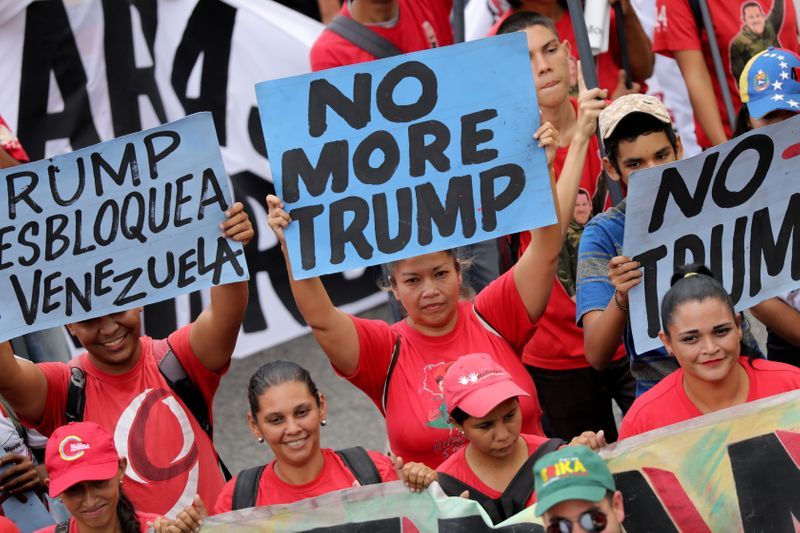– KEN LIVINGSTONE looks in-depth at the story of US sanctions on Venezuela
THE imposition of sanctions is just one of many weapons used by the United States in its war on Venezuela, but a particularly deadly one.
The ultimate goal is “regime change” — to bring down the country’s government and gain access to the wealth to be made from the largest oil deposits in the world.
Two legal mechanisms laid the groundwork for these long-running sanctions, which have been extended again and again during the Trump presidency.
First in 2014 the passing by Congress of a law supposedly for the “defence of human rights and civil society in Venezuela.”
Second, the signing by president Barack Obama of an executive order bizarrely designating Venezuela as “an unusual and extraordinary threat to the US national security.”
These legal mechanisms, passed without adequate justification or supporting evidence, opened the door for unilateral coercive measures, despite the fact that such measures are in violation of international law under the UN Charter, the Organisation of American States Charter and even US law.
Early measures included sanctions against the Central Bank of Venezuela and Venezuela’s oil company, the PDVSA, the freezing of Venezuelan assets abroad and the cancellation of visas for Venezuelan public officials, military officers or diplomats.
The aim was to create an economic embargo on Venezuela and obstruct international relations, in the hope that the resulting economic problems and hardship would result in the ousting of Nicolas Maduro’s government.
The effects were felt in Venezuela almost immediately and have got more stark each year since, especially since Trump’s election, which saw the intensification of sanctions and the financial boycott.
In 2016 risk ratings agencies assigned Venezuela the world’s highest financial risk, well above countries at war, despite the country having fulfilled its external debt commitments.
Business confidence fell and foreign companies based in Venezuela started to pull out, disrupting supplies of essential goods.
Foreign banks and companies abroad became reluctant to trade with Venezuela for fear of the consequences.
For example, Citibank refused to handle Venezuelan funds for the purchase of 300,000 insulin doses for patients with diabetes; a shipment of new banknotes failed to arrive from the company contracted by the Venezuelan state to print currency.
Then a further executive order from Trump prohibited all transactions aimed at financing Venezuela, banned direct or indirect purchases of Venezuelan government securities, which included bonds, loans, credit extensions, loan guarantees, credit letters, drafts, bankers acceptance, invoices or discount notes and commercial papers.
The effects have been wide-ranging. For example, in 2017 US banks blocked 19 bank accounts Venezuela had been using to pay for land transport cabotage services.
The resulting fuel shortages disrupted transactions relating to 471,000 tyres which had already been paid for; in 2018 treatment was disrupted for over 15,000 haemodialysis patients in Venezuela because the payment of $9 million for dialysis supplies was blocked because of US sanctions.
New executive orders tightened the financial embargo and increased penalties on other countries trading with Venezuela.
It became impossible to repatriate dividends from Citgo Petroleum, the PDVSA’s US subsidiary, starving the country of vital hard currency, and another executive order prohibited financial transactions with the “Petro,” Venezuela’s state-owned cryptocurrency.
Secondary sanctions have deterred or disrupted most foreign trade and there are multiple examples of third countries that have been obstructed in their ability to have normal trade relations with Venezuela because of penalties threatened by the United States.
For example, the Russian oil giant Rosnet withdrew from business with Venezuela; European banks delayed a $29.7m transaction with which the Venezuelan food programme had arranged to pay its suppliers; the Brazilian government was unable to pay Venezuela for electricity supplied to Roraima state because of US sanctions; a shipment of 400,000 kilos of supplies, purchased for the Venezuelan food subsidy programme, was blocked by the Colombian government.
Foreign banks have also played their part in the economic war on Venezuela, influenced by the US.
Large quantities of Venezuelan funds have been seized by banks, including €1.5 billion by Novo Banco, €453m by Clearstream and £1.3bn by the Bank of England.
As the grip of the US blockade tightens, the effects on the Venezuelan economy and, in turn, the Venezuelan people, have been devastating.
The US-based Centre for Economic Policy and Research estimated that US sanctions caused more than 40,000 deaths in Venezuela from 2017 to 2018 alone.
Trump’s latest strategy to undermine the Venezuelan government has been to lend his support to the minor politician and self-declared “president” Juan Guaido.
Britain has followed suit, along with the EU and a number of US allies. However, more than two-thirds of the member states of the United Nations continue to recognise President Nicolas Maduro as the leader of Venezuela.
It also goes without saying that it is President Maduro who is actually in control of Venezuela’s government and institutions.
In 2020, as Venezuela tackles the Covid-19 crisis, Trump’s unilateral coercive measures are not only more damaging to the Venezuelan people, but also even harder to justify.
Opposition to any sanctions during the global pandemic has come from a range of voices, including the Pope, who called for an end to sanctions that prevent countries from “providing adequate support to their citizens,” and UN secretary-general Antonio Guterres, who called for the waiving of sanctions on Venezuela, saying: “This is the time for solidarity not exclusion.”
Now more than ever it’s vital to step up our expressions of international solidarity with Venezuela and make it clear that sanctions are not only illegal but also unacceptable and unjustifiable.
You can follow Ken at www.twitter.com/Ken4London and www.facebook.com/KenLivingstoneOfficial.
Sign the Venezuela Solidarity Campaign petition against Trump’s illegal sanctions on Venezuela at bit.ly/stopvenezuelasanctions.
This article originally appeared in The Morning Star

